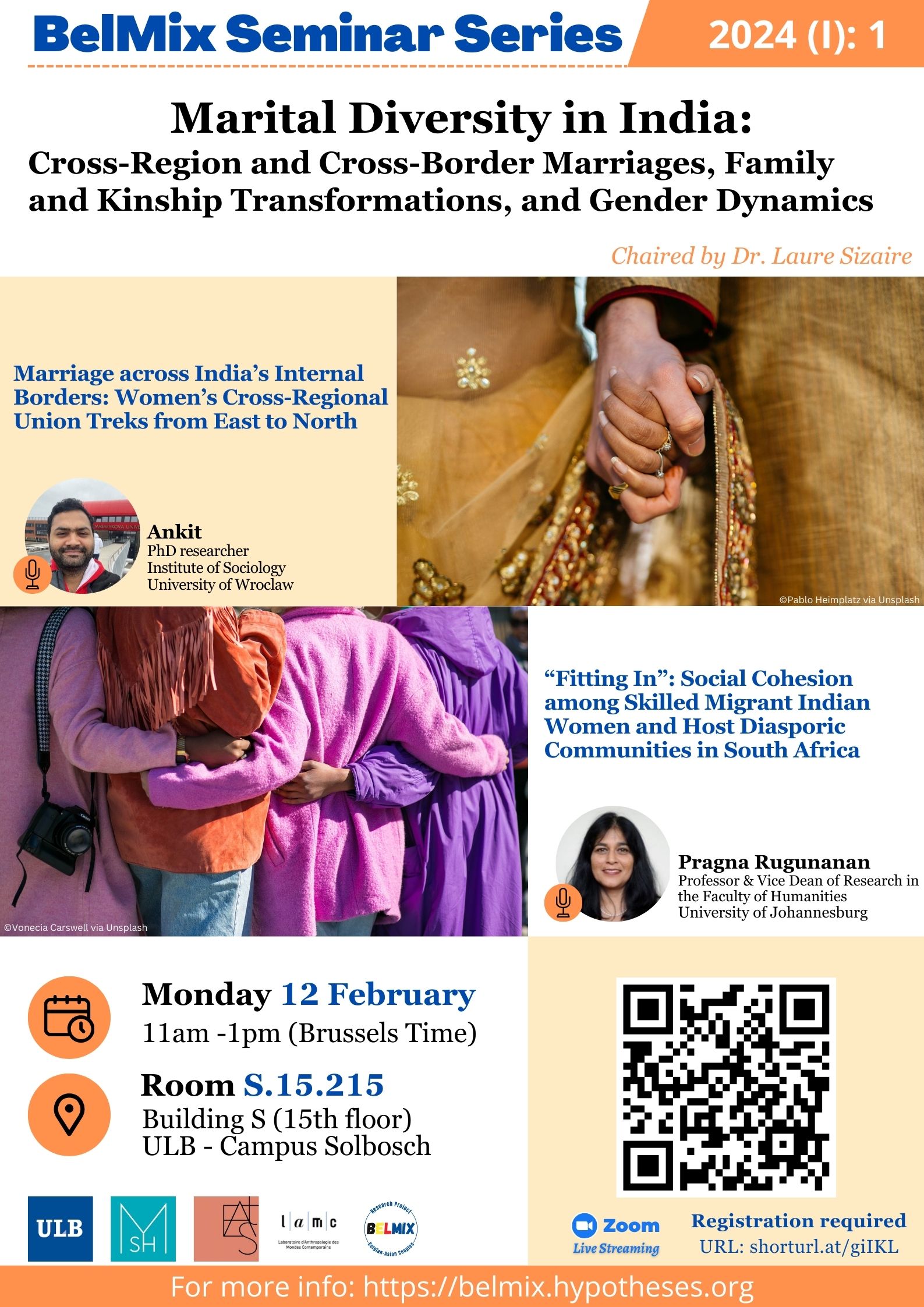- IS
- FR
- Agenda
-
Partager cette page
BelMix seminar series 2023-2024 - Marital Diversity in India: Cross-Region and Cross-Border Marriages, Family and Kinship Transformations, and Gender Dynamics

Presentation-1
Title: Marriage across India’s Internal Borders: Women’s Cross-Regional Union Treks from East to North
Speaker: Ankit (PhD researcher, Institute of Sociology, University of Wroclaw, Poland)
Abstract:
This presentation examines the experiences of women who migrate from Eastern states to marry into families in rural Haryana, North India. Through an analysis of existing sociological research combined with findings from my own doctoral fieldwork, I explore the motivations, processes, and outcomes shaping these marital treks which traverse India’s internal state borders. Scholars have long documented how the skew in India’s gender ratio fuels the migration of women for marriage from areas with relatively balanced sex ratios to those imbalanced regions with deficits of potential brides. This imbalance combined with cultural notions of village exogamy and caste endogamy provides impetus for men in Haryana and elsewhere in North India to seek wives from East and Northeast India. Though motivations vary, women often migrate seeking enhanced socioeconomic status and life opportunities apart from the agency to choose their marital home. Nevertheless, they must navigate complex power relations, structural inequalities, and cultural differences once embedded within their new familial and regional contexts after marriage. I try to see similarities between the east Asian cross-border marriages with these cross-regional marriages in rural India as well.
My fieldwork consists of in-depth interviews with emerging adult children born to women who have migrated from Odisha, West Bengal, and other Eastern states to marry into families across rural Haryana. I also interview mothers and local stakeholders such as village heads (sarpanches) to investigate the processes shaping children’s development and identity formation in these cross-regional families. Preliminary findings reveal complex identity negotiations for these children as they come of age, seeking to balance the cultural values of both their maternal and local backgrounds. The linguistic, religious, or caste differences distinguishing their mothers often mark these children as outsiders within their Haryanvi peer contexts, complicating their social integration and status.
(See short documentary “Bittoo: searching for self in a cross-regional family” and reference: https://doi.org/10.31265/jcsw.v18i1.583)
Bio:
Ankit is currently a third year doctoral student in Sociology at the Institute of Sociology, University of Wroclaw in Poland. His doctoral thesis documents the biographical in-depth narratives of the emerging adults the lived experiences of women from cross-regional families in rural North India. He is also the principal investigator for a year-long project about forming a solidarity network for cross-regional women at a block level in rural India funded by the Indian School of Development Management (ISDM), New Delhi. He has over four years of work experience in the development sector at grassroots level in India and has done two master degrees in Development and Social Work. His doctoral thesis is expected to be submitted by the end of 2025 and his thesis supervisor is Dr. ha. Iwona Taranowicz, prof. UWr, a noted family sociologist of Poland.
Presentation-2
Title: “Fitting In”: Social Cohesion among Skilled Migrant Indian Women and Host Diasporic Communities in South Africa
Speaker: Pragna Rugunanan (Professor & Vice Dean of Research in the Faculty of Humanities, University of Johannesburg, South Africa)
Abstract:
Migration has traditionally been seen as a primarily male domain, particularly in developing countries. However, global practices have increased the visibility of women migrants such that the feminisation and irregularisation of migration has led to new flows of transnational migrant movements, particularly to South Africa. Attention is drawn to the growth of South-South migration, specifically focusing on Indian migrant women, as accompanying their professional spouses migrating to South Africa. Set within a social cohesion framework, this paper examines how women attempt to find a ‘fit’ in a socially diverse society where distrust, exclusion and racism still prevail. This investigation is based on exploratory research using qualitative interviews conducted with married Indian women. The focus of this paper examines the reasons for their migration, their choice to migrate specifically to South Africa, perceptions of South Africa, their sense of inclusion and observes if they develop a sense of belonging to the country. Preliminary findings show that the migrants find South Africans very tolerant, but keep to themselves as the fear of crime impedes integration. The paper also contextualises the migration of African women from the continent to South Africa within the context of migration, family and reasons for moving.
Bio:
Pragna Rugunanan is a Professor at the University of Johannesburg (UJ). She was recently appointed to the position of Vice Dean of Research in the Faculty of Humanities. She is an NRF-rated scholar and was invited to join the Canadian Excellence Research Chair in Migration at Ryerson University, Toronto, as a Distinguished Scholar in September 2022 to work in the thematic area ‘Southern’ Perspectives on Migration and Migrant Integration. Pragna’s research interests include the sociology of migration, labour studies, changing patterns of work, social networks, and community studies. She has published on migration, gender, xenophobia, education and citizenship. Her current research is titled ‘Migration, Identities and Trans-continental Linkages: Studying the South Indian Diaspora in South Africa’.
Registration required: https://forms.gle/6H9E9cVkh632yXHT6
de 11h à 13h
ULB - Campus Solbosch
Building S
Room S15.215 (15th floor)
Rue Jeanne, 44
1050 - Bruxelles
